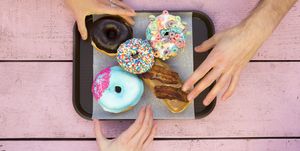If you’ve been trying to lose weight the smart way—you’ve got your meal prep game on point, stopped eating that oversized muffin for breakfast, and are trying to take your culinary skills beyond chicken and broccoli—but feel like you’re just not dropping pounds like you’d like to because there are habits that just keep getting in your way, is it just wishful thinking to consider whether hypnosis could be your weight loss breakthrough?
Unsurprisingly, there’s not a whole lot of recent research on using hypnosis to lose weight. But a randomized controlled trial, published in Obesity 2018, looked at severely obese participants who used self-hypnosis alongside a typical weight reduction program (e.g. exercise and changes to eating behaviors, like not being distracted when eating or putting your fork down between bites) compared to a control who received only the lifestyle recommendations. In the self-hypnosis group, they were given three sessions with the goal of teaching them to boost self-control before meals.

The result? After a year, both the self-hypnosis and control groups lost about the same amount of weight—14 and 12 pounds, respectively. A pretty insignificant difference. But the people who bought into the practice—who were considered “habitual hypnosis users”—ended up losing more weight (21 pounds), ate about 683 fewer calories per day, and reported greater satiety, less inflammation, and better quality of life at the year’s end.
“Often people say that hypnosis is their last resort, but people get a lot of great results from it,” says Rebecca Lauer, a certified hypnotist in Chicago and a NGH instructor. Obviously, she’s pro-hypnosis, but it’s most useful in certain situations, she says—and it has its limitations. By hypnosis, they don’t mean the performative magician swinging-watch type of thing. One way to think about it is that self-hypnosis is a way to relax and amplify the resources you have in you to manage self-control.
And hypnosis tends to be best for annihilating cravings. Lauer uses a mild aversion technique that asks people to imagine holding a two-pound ball of fat with a candy bar on top. Those under hypnosis are asked to imagine the candy bar melting and making the fat ball bigger and bigger. In the real world, this translates into not wanting the sweets anymore.
Another technique is to imagine two futures a year from now. One where you achieved your goals and another where you’re still struggling with the same problems. These visualization techniques can help you gain the self-control needed to avert cravings, something that can help you eat fewer calories, and eventually lose weight.
People often see results in three sessions, but it depends on how well you respond to hypnosis (everyone is different) and the complexity of the issue at play, says Lauer.
Some guys come to Lauer because they think they need hypnosis, but it’s clear they need a session with a nutritionist to learn about healthy eating habits. Others need to manage their anxiety or stress or work on self-confidence before anything else. Using hypnosis too early, in this case, won’t get to the root of what’s really going on (such as out-of-control stress that drives emotional eating).
“Nothing works for everyone all the time. My goal is to help them put the brakes on a bit so they’re more mindful of the choices they’re making,” says Lauer.
Source: Read Full Article


